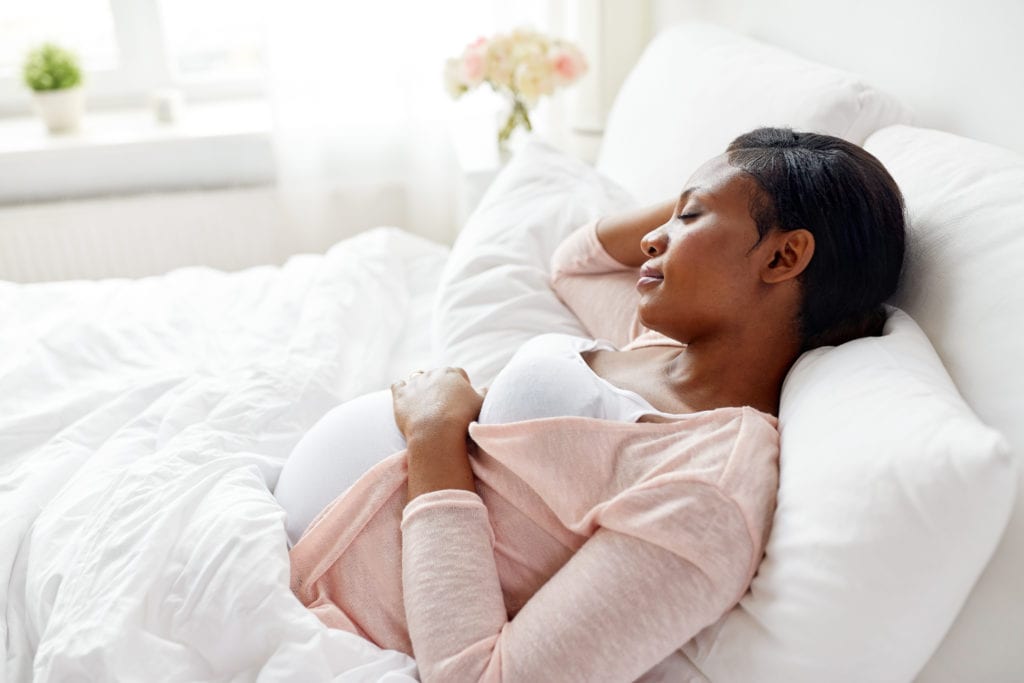Whether you’re in your first, second or third trimester, sleep is probably more difficult to come by now than it was before you were pregnant. From midnight bathroom trips to nighttime nausea to heartburn, there are so many pregnancy symptoms that make catching those Z’s nearly impossible at times. But there are ways you can make it easier for yourself. Consider these tips for getting a better night’s sleep.
If you always have to get up to pee…
Blame it on higher progesterone levels and your growing uterus, which is pressing against your bladder and making it seem like you have to go even 20 minutes after you just went. To cut down on the problem, avoid drinking lots of fluids after 6pm and drink your caffeinated beverages in the morning – not the afternoon.
If you feel queasy during the night…
Bring a couple of snacks into your bedroom before you hit the hay. A couple of saltines or a banana can help calm your stomach and you won’t have to go into the kitchen to get them.
If your worries are keeping you up…
It helps to talk to your partner or a friend about all of the things that are stressing you out about your pregnancy, whether it’s the symptoms themselves, the thought of becoming a parent or the stress of picking a baby name. You might even want to start keeping a journal of your thoughts, which you can write in before bedtime.
If you keep getting heartburn…
You need to adjust your dinnertime habits. For starters, avoid eating foods that are known to induce heartburn, like spicy, fried and acidic foods. Next, try to stay upright for four hours after you’re done eating. This can help keep your stomach acid from creeping up into your esophagus. Finally, eat smaller meals instead of large ones.
If leg cramps are bothersome…
It might be the result of a calcium imbalance. Try to avoid drinking carbonated beverages, which are full of phosphorus that decreases the amount of calcium your body can metabolize. Getting plenty of calcium from your prenatal vitamins and diet can also help. If you get a cramp, flexing your foot and bringing your toes up toward your head can help.
If you’re having wild dreams…
These are common in many pregnant women. Stress and anxiety can cause you to have vivid dreams, which often revolve around your baby and disturb your sleep. You might be able to lessen their frequency by quieting your mind before bed with some yoga breathing or by putting your thoughts on paper.
If you can’t get comfortable…
Try getting creative with your pillow placements. Tuck one underneath your baby bump, one behind your back and another in between your legs. This helps support your lower back and can make sleeping on your side a lot more comfortable.
If restless leg syndrome is driving you nuts…
You’re not alone. About 20 percent of pregnant women experience this condition, which can make sleep nearly impossible. Research has found that it’s most common in women with low levels of iron and folate, so make sure you’re getting plenty of these nutrients. Caffeine can also inhibit the absorption of these, so if restless leg syndrome is a problem, you might have to give up coffee and soda.
If you just don’t feel tired…
You’ll have to tire yourself out during the day. Exercising in the morning and early afternoon can help you get better sleep at night, but don’t engage in activity later than that. Any exercise before bed will energize your body, making it harder to fall asleep. Also, avoid taking naps after 4pm.
